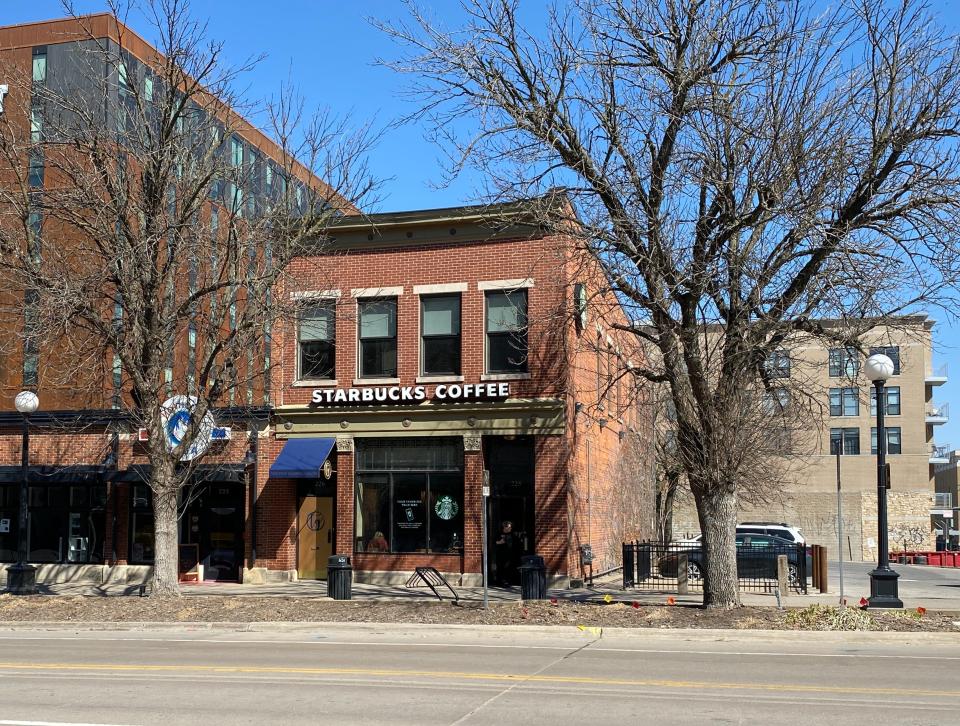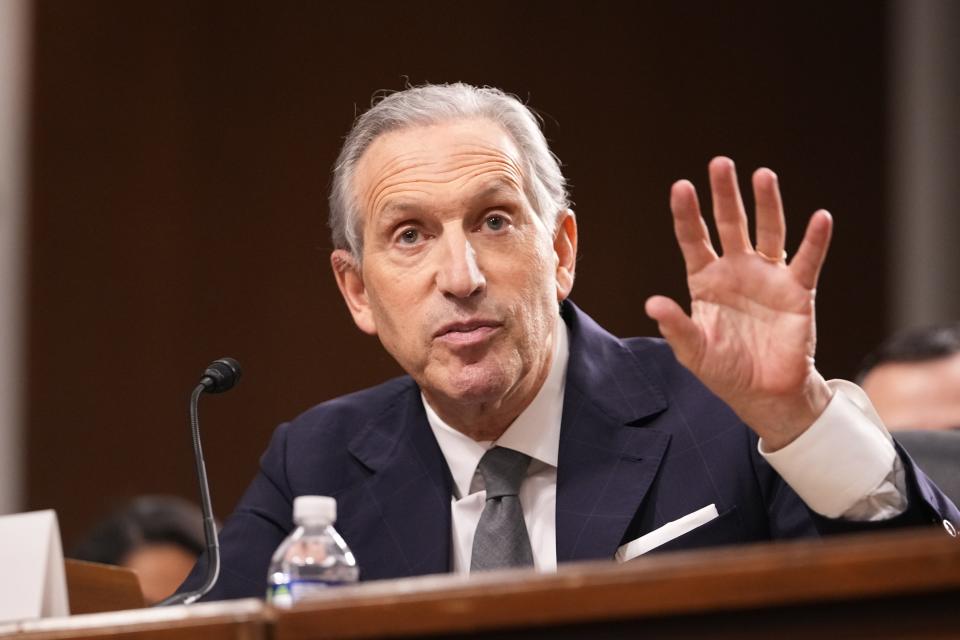Starbucks unionization drive reaches Iowa as Iowa City workers file for union election

Employees at a Starbucks store in downtown Iowa City are the first at the chain in Iowa to signal their intent to hold a unionization vote.
The employees at the 228 S. Clinton St. store announced Monday in a video posted to Twitter and TikTok that they had petitioned National Labor Relations Board to conduct the election. Starbucks Workers United, the main union representing Starbucks workers nationally, posted the video.
The unionization process starts when at least 30% of eligible workers at a workplace sign cards or a petition requesting to join a union. At that point the NLRB conducts an election. If a majority vote to form a union, the NLRB certifies it as the representative to collectively bargain on behalf of workers.
Employers also may voluntarily recognize unions. Under federal law, once a union is certified or recognized, an employer is required to bargain with it over terms and conditions of employment.
The NLRB filing said full-time and part-time baristas and shift supervisors will be included in the Iowa City union if it’s certified. Excluded would be other supervisors and the store managers.
In Monday’s video, employees from the Iowa City store said they are seeking a union to ensure consistent scheduling and ensure a better and safer work environment.
The March Madness wins for Iowa continue off the court!
Burlington & Clinton in Iowa City is the first store in the state to file for a union election!! pic.twitter.com/tO1qjWrXIu— Starbucks Workers United (@SBWorkersUnited) March 27, 2023
Evie Roberts, an employee at the store, told The Daily Iowan that safety incidents have been an issue at the store.
“We know what’s best for our health and safety and our customer’s health and safety so we’re trying to secure that,” Roberts was quoted as saying.
At least 293 of Starbucks’ 9,000 company-owned U.S. Starbucks stores have voted to unionize since late 2021. Starbucks Workers United has yet to reach a contract with the company for workers at any of those stores.
Starbucks contends that it already provides some of the best pay and benefits in the industry and that stores work better when the company works directly with employees. In a statement, a Starbucks spokesperson noted that workers, called "partners," in the company's parlance, have petitioned to start unions at less than 3% of Starbucks' U.S. stores. At stores where workers petition for union representation, Starbucks' "focus is to ensure that they can trust the process is fair and their voice is heard," the statement said.
"We believe our direct relationship as partners is core to the culture and experiences we create in our stores," the statement said. "Should partners at our Clinton Street store vote in favor of union representation, we look forward to meeting Workers United in-person to begin the single-store collective bargaining process."
Workers United representatives did not respond to requests for comment.
Iowa Restaurant Association head calls union push 'surprising'
Jessica Dunker, Iowa Restaurant Association president and CEO, said the Starbucks employees’ push to unionize is unexpected because the company has traditionally been seen as a company with good wages and benefits.
“I’m a little surprised that’s where the energy is coming from," Dunker said. "Obviously workers have the right to organize. It’s not something that we’re seeing widespread in the industry."
Half of U.S. residents get their first jobs in the restaurant industry, Dunker said. The industry also hires scores of people re-entering the workforce. Given the transient nature of the workforce outside management levels in restaurants, unions are not one of the top issues for restaurant employees, she said.
"So there isn't necessarily in most restaurants a big pool of people where this would be something that is top of mind," Dunker said.
She also said the issues employees at Starbucks want resolved are not problems at other food and beverage outlets in Iowa, where staff members are stretched thin because there are not enough people working, Dunker said.
“Because of that restaurants are focusing hard on trying to take care of their staff,” Dunker said. “You’re seeing people take tables out of their restaurants. They’re closing an extra day because the people that they have, they need to keep fresh and happy and not burnt out.”
Former Starbucks CEO testifies before Sanders committee
On Wednesday, Howard Schultz, who has served as Starbucks CEO three times since 1986, testified before the Senate Health, Education, Labor and Pensions Committee, denying allegations that the company has illegally tried to subvert unionization.
Schultz stepped down as interim CEO March 20 but remains on the Starbucks board of directors.

A report from staff members for U.S. Sen. Bernie Sanders, the Vermont independent who chairs the committee, said that in the 18 months Schultz was interim CEO in 2022 and 2023, Starbucks “waged an aggressive and illegal union-busting campaign.”
Earlier this month an NLRB judge ruled the company had committed "hundreds of unfair labor practices," including illegally disciplining and firing employees during unionization efforts at stores in the Buffalo, New York, area.
Schultz in his testimony to the committee said Starbucks respects the right of its employees to unionize. However, he said, the company already provides good wages and benefits and does not need unions.
“We've done everything that we possibly can to respect the right under the law of our partners' ability to join a union,” Schultz said. “But conversely, we have consistently laid out our preference, without breaking any law, of communicating to our people what we believe is our vision for the company.”
A statement from Starbucks noted that over the past year the company raised its average wage to $17.50 per hour and allowed tipping on credit and debit card transactions. But Sen. Tina Smith, a Minnesota Democrat, noted that the company refused to add those and other benefits at stores that have unionized. Schultz countered that they are subject to bargaining.
Smith said labor organizers are seeking to address an imbalance of power within the company. Workers say Starbucks cuts their schedules with little notice, for example, pushing them below the minimum number of hours to qualify for benefits.
“You're a billionaire and they are your employees. The imbalance is extreme,” Smith said.
Sanders, a vocal supporter of Starbucks labor organizers, accused the company of trying to stall the union drive.
“The fundamental issue we are confronting today is whether we have a system of justice that applies to all, or whether billionaires and large corporations can break the law with impunity,” Sanders said.
USA Today and the Associated Press contributed to this article.
Philip Joens covers retail, real estate and RAGBRAI for the Des Moines Register. He can be reached at 515-284-8184, pjoens@registermedia.com or on Twitter @Philip_Joens.
This article originally appeared on Des Moines Register: In an Iowa first, Iowa City Starbucks workers seek union vote
